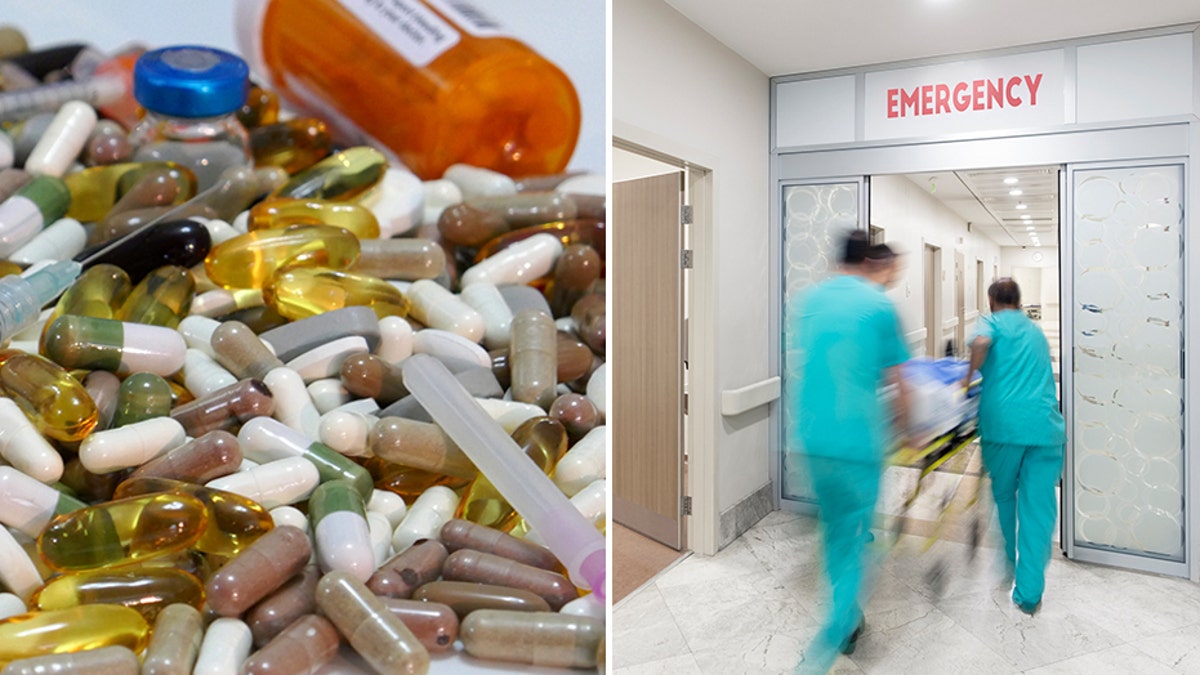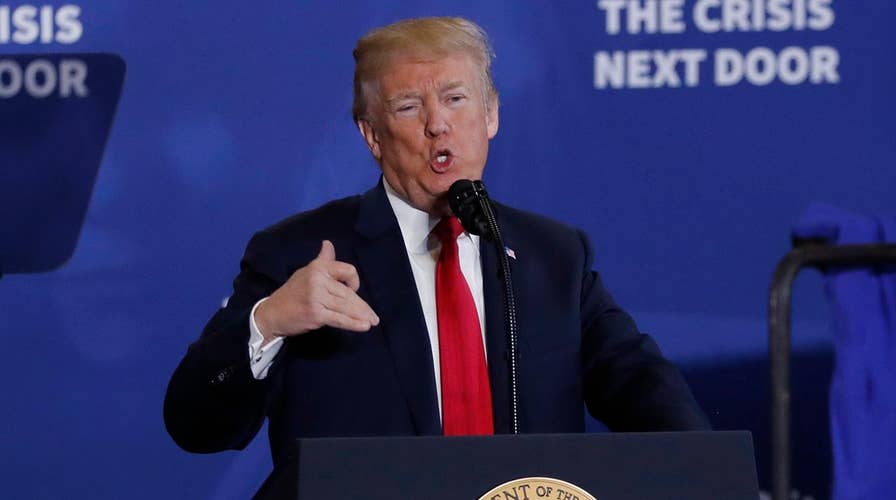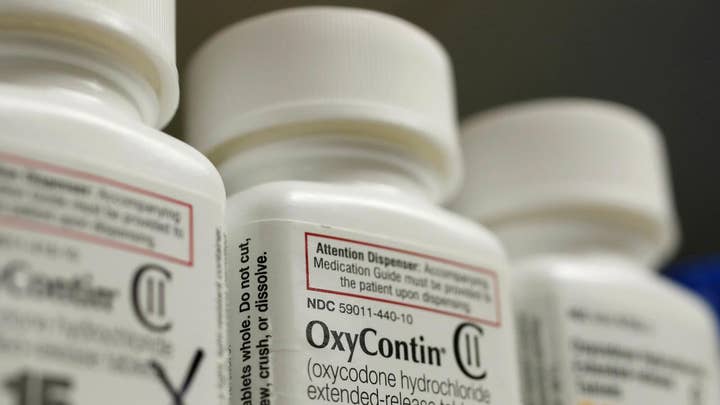Trump: Getting tough on drug dealers includes death penalty
President Trump addresses nation's opioid crisis at event in Manchester, New Hampshire.
Speaking from one of the states hardest hit by the opioid epidemic, President Trump on Monday laid out a battle plan that calls for harsher sentences - and even the death penalty - for traffickers.
Trump called for expanded treatment options for victims in the Manchester, N.H., speech, but leveled most of his emphasis on beefed-up enforcement. And he heaped plenty of scorn on the people he believes are responsible for as many as 42,000 U.S. deaths per year.
"These are terrible people and we have to get tough with those people," Trump said of traffickers and dealers. "This isn’t about committees... this is about winning a very tough problem."
"The ultimate penalty has to be the death penalty," Trump said, before musing, "maybe our country is not ready for that."
Trump wants Congress to pass legislation reducing the amount of drugs needed to trigger mandatory minimum sentences for traffickers who knowingly distribute certain illicit opioids. The death penalty would be pursued where appropriate under current law. Justice Department says the federal death penalty is available for several limited drug-related offenses, including violations of the "drug kingpin" provisions in federal law.
Trump reiterated an observation he has shared several times before -- that a person in the U.S. can get the death penalty or life in prison for shooting one person, but that a drug dealer whose actions could lead to thousands of overdoses can spend little or no time in jail.
The president said the federal government may consider aggressive litigation against pharmaceutical companies deemed complicit in the crisis.

"Whether you are a dealer or doctor or trafficker or a manufacturer, if you break the law and illegally peddle these deadly poisons, we will find you and we will arrest you and we will hold you accountable," Trump said.
Trump singled out Mexico and China as main sources of illicit opioids. A Drug Enforcement Administration report last year said: "Seizures indicated that China supplies lower volumes of high-purity fentanyl, whereas fentanyl seizures from Mexico are higher volume but lower in purity."
Smuggling operations in both countries constantly try to elude U.S. officials by selling through the Internet and sending the substances – which chemists for these traffickers often alter to avoid detection – through the U.S. postal service, U.S. officials have said.
Trump also announced a nationwide public awareness campaign, as well as increased research and development through public-private partnerships between the federal National Institutes of Health and pharmaceutical companies.
He announced a new website, Crisisnextdoor.gov, where people can share their stories about addiction. The hope is that horror stories will scare people away from behavior that could lead to addiction.
The Trump administration aims to see the number of filled opioid prescriptions cut by one-third within three years.
A third part of the plan addresses improving access to treatment and recovery programs that have proven effective. Many health professionals, relatives of those who have died of overdoses and people who have experienced addiction to opioids have been pushing for treatment to be a key component of any campaign to fight the epidemic.
"Failure is not an option," the president said. "Addiction is not our future. We will liberate our country from this crisis."
Opioids, including prescription opioids, heroin and synthetic drugs such as fentanyl, killed more than 42,000 people in the U.S. in 2016, more than any year on record, according to the Centers for Disease Control and Prevention.
And a recent CDC report said that the number of people checking into the emergency room after overdosing rose by 30 percent between July 2016 and September 2017.
"Drug dealers show no respect for human dignity and put their own greed ahead of the safety and even the lives of others. Drug trafficking is an inherently violent and deadly business: if you want to collect a drug debt, you collect it with the barrel of a gun. As surely as night follows day, violence and death follow drug trafficking, and murder is often a tool of drug traffickers," Attorney General Jeff Sessions reacted. "At the Department of Justice, we have made ending the drug epidemic a priority. We will continue to aggressively prosecute drug traffickers and we will use federal law to seek the death penalty wherever appropriate."
"We cannot arrest our way out of the opioid epidemic—we tried that and ended up with an even bigger addiction problem and the world’s largest prison population," Senate Minority Whip Dick Durbin, R-Ill., responded. "The war on drugs didn’t work in the 80’s, and it won’t work now by reviving failed deterrence measures like the death penalty for drug dealers. We must instead crack down on the over-production and over-prescribing of painkillers, and increase treatment for those suffering from addiction—both of which have bipartisan support in Congress."
Last October, Trump declared the crisis a national public health emergency, short of the national state of emergency sought by a presidential commission he put together to study the issue.
Meanwhile, Congress plans to weigh a range of bills targeted at curbing the epidemic. The bills cover everything from improving access to treatment to intercepting shipments of illicit opioids en route to the United States.
"Our recommendations will be urgent and bipartisan, and they will come very quickly," said Sen. Lamar Alexander, R-Tenn., chairman of the Senate Health, Education, Labor and Pensions Committee, according to published reports.
Fox News' Jason Donner, Jake Gibson and The Associated Press contributed to this report.






















